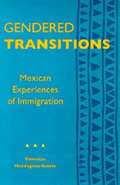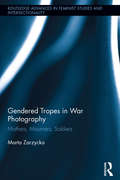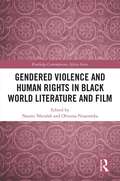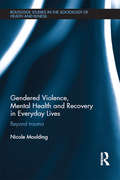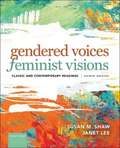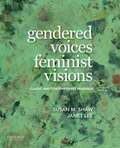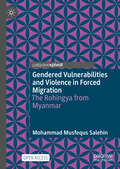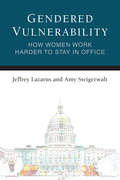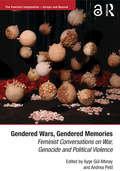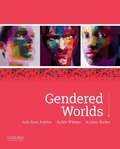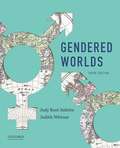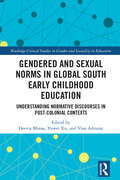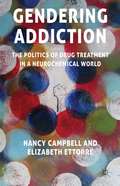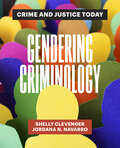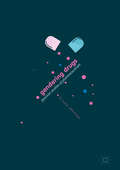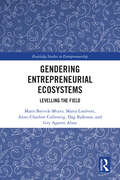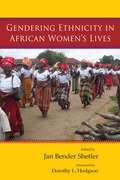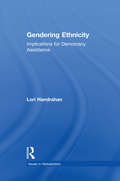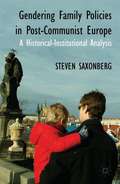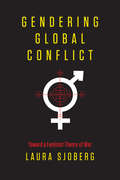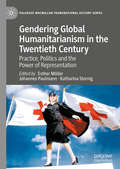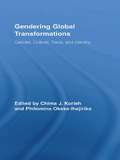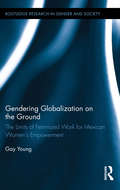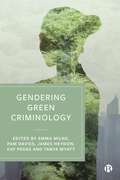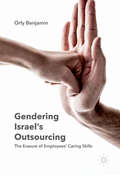- Table View
- List View
Gendered Transitions: Mexican Experiences of Immigration
by Pierrette Hondagneu-SoteloThe momentous influx of Mexican undocumented workers into the United States over the last decades has spurred new ways of thinking about immigration. Pierrette Hondagneu-Sotelo's incisive book enlarges our understanding of these recently arrived Americans and uncovers the myriad ways that women and men recreate families and community institutions in a new land. Hondagneu-Sotelo argues that people do not migrate as a result of concerted household strategies, but as a consequence of negotiations often fraught with conflict in families and social networks. Migration and settlement transform long-held ideals and lifestyles. Traditional patterns are reevaluated, and new relationships--often more egalitarian--emerge. Women gain greater personal autonomy and independence as they participate in public life and gain access to both social and economic influence previously beyond their reach. Bringing to life the experiences of undocumented immigrants and delineating the key role of women in newly established communities, Gendered Transitions challenges conventional assumptions about gender and migration. It will be essential reading for demographers, historians, sociologists, and policymakers. "I've opened my eyes. Back there, they say 'no.' You marry, and no, you must stay home. Here, it's different. You marry, and you continue working. Back in Mexico, it's very different. There is very much machismo in those men."--A Mexican woman living in the United States.
Gendered Tropes in War Photography: Mothers, Mourners, Soldiers (Routledge Advances in Feminist Studies and Intersectionality)
by Marta ZarzyckaPhotographic stills of women, appearing in both press coverage and relief campaigns, have long been central to the documentation of war and civil conflict. Images of non-Western women, in particular, regularly function as symbols of the misery and hopelessness of the oppressed. Featured on the front pages of newspapers and in NGO reports, they inform public understandings of war and peace, victims and perpetrators, but within a discourse that often obscures social and political subjectivities. Uniquely, this book deconstructs – in a systematic, gender-sensitive way – the repetitive circulation of certain images of war, conflict and state violence, in order to scrutinize the role of photographic tropes in the globalized visual sphere. Zarzycka builds on feminist theories of representations of war to explore how the concepts of femininity and war secure each other’s intelligibility in photographic practices. This book examines the complex connections between photographic tropes and the individuals and communities they represent, in order to rethink the medium of photography as a discursive and political practice. This book interrogates both the structure and transmission of contemporary encounters with war, violence, and conflict. It will appeal to advanced students and scholars of gender studies, visual studies, media studies, photography theory, cultural anthropology, cultural studies, and trauma and memory studies.
Gendered Violence and Human Rights in Black World Literature and Film (Routledge Contemporary Africa)
by Naomi Nkealah and Obioma NnaemekaThis book investigates how the intersection between gendered violence and human rights is depicted and engaged with in Africana literature and films. The rich and multifarious range of film and literature emanating from Africa and the diaspora provides a fascinating lens through which we can understand the complex consequences of gendered violence on the lives of women, children and minorities. Contributors to this volume examine the many ways in which gendered violence mirrors, expresses, projects and articulates the larger phenomenon of human rights violations in Africa and the African diaspora and how, in turn, the discourse of human rights informs the ways in which we articulate, interrogate, conceptualise and interpret gendered violence in literature and film. The book also shines a light on the linguistic contradictions and ambiguities in the articulation of gendered violence in private spaces and war. This book will be essential reading for scholars, critics, feminists, teachers and students seeking solid grounding in exploring gendered violence and human rights in theory and practice.
Gendered Violence, Abuse and Mental Health in Everyday Lives: Beyond Trauma
by Nicole MouldingGendered Violence, Abuse and Mental Health in Everyday Lives: Beyond Trauma offers new insights into the social dimensions of emotional distress in abuse-related mental health problems, and explores the many interconnections between gendered violence, different forms of abuse and poor mental health. Looking at how individuals can overcome the impact of abuse over the course of their lives, Moulding maps a feminist-informed recovery-oriented approaches to therapy and prevention. Drawing on sociological perspectives and a wide range of international research, as well as original qualitative data presented here for the first time, this book: -Demonstrates how gender and other social power relations play out in the specific emotional dimensions of some of the mental health problems most strongly linked to abuse, including post-traumatic stress disorder, anxiety, depression and eating disorders; -Critiques the way that mainstream psychological theory and research pathologises the effects of abuse through various mental illness diagnoses, obscuring the nature of the individual emotional distress involved, its social context and relational nature; -Outlines a feminist-informed, recovery-oriented approach that aims to reduce violence against women and children. This innovative volume is an important contribution to the literature on the impact of violence and abuse on the lives and health of its survivors. It will be of interest to students and researchers from a range of disciplines and professions, including social work, gender studies, sociology, social policy, psychology, counselling, mental health, public health, medicine and nursing.
Gendered Voices, Feminist Visions
by Janet Lee Susan M. ShawGendered Voices, Feminist Visions: Classic and Contemporary Readings, Eighth Edition, is a balanced collection of classic, conceptual, and experiential selections. Accessible and student-friendly, the readings reflect the great diversity of women's experiences. Framework essays provide context and connections for students, while features like learning activities, ideas for activism, and questions for discussion provide a strong pedagogical structure for the readings.
Gendered Voices, Feminist Visions: Classic And Contemporary Readings
by Susan Shaw Janet LeeGendered Voices, Feminist Visions: Classic and Contemporary Readings, Seventh Edition, is a balanced collection of classic, conceptual, and experiential selections. Accessible and student-friendly, the readings reflect the great diversity of women's experiences. Framework essays provide context and connections for students, while features like learning activities, ideas for activism, and questions for discussion provide a strong pedagogical structure for the readings.
Gendered Vulnerabilities and Violence in Forced Migration: The Rohingya from Myanmar
by Mohammad Musfequs SalehinThis open access book investigates the gendered violence and vulnerabilities experienced by Rohingya men and women, drawing on qualitative data from refugee camps in Bangladesh. It shows that in Myanmar, men suffered torture and sexual violence, while women experienced physical, mental and sexual violence, legitimized by patriarchal norms. Sexual violence was wielded as a weapon to coerce their exodus from Myanmar and to disrupt the essential facets of Rohingya femininity, motherhood, and reproductive capabilities. Structural, cultural and symbolic violence affected the Rohingya differently across gender lines. A gendered threat narrative and othering cast women as ‘ugly’ and reproductive threats while men are framed as potential threats to national security and Buddhist nationalism. In Bangladesh, gendered othering continued, with Rohingya men seen as security threats and women as vulnerable victims. This book contributes to peace and conflict studies, gender studies, and migration and refugee studies, by analysing gendered violence.
Gendered Vulnerability: How Women Work Harder to Stay in Office (Legislative Politics And Policy Making)
by Amy Steigerwalt Jeffrey LazarusGendered Vulnerability examines the factors that make women politicians more electorally vulnerable than their male counterparts. For instance, female candidates get less and lower quality coverage from the media; they face more and better quality political opponents; and they receive less support from their political parties. Beyond these purely electoral factors, women face persistent gender biases throughout society, which makes it more difficult for them to succeed and can also lead them to doubt their abilities and qualifications. These factors combine to convince women that they must work harder to win elections—a phenomenon that Jeffrey Lazarus and Amy Steigerwalt term “gendered vulnerability.” Since women feel constant pressure to make sure they can win reelection, they devote more of their time and energy to winning their constituents’ favor. For example, women secure more federal spending for their districts and states than men do; women devote more time and energy to constituent services; women introduce more bills and resolutions; and women’s policy positions are more responsive to what their voters want. Lazarus and Steigerwalt examine a dozen different facets of legislative behavior, and find that across them all, female embers simply do a better job of representing their constituents than male members.
Gendered Wars, Gendered Memories: Feminist Conversations on War, Genocide and Political Violence (The Feminist Imagination - Europe and Beyond)
by Ayşe Gül AltinayThe Introduction of this book is freely available as a downloadable Open Access PDF under a Creative Commons Attribution-Non Commercial-No Derivatives 4.0 license available at http://www.taylorfrancis.com/books/e/9781315584225 The twentieth century has been a century of wars, genocides and violent political conflict; a century of militarization and massive destruction. It has simultaneously been a century of feminist creativity and struggle worldwide, witnessing fundamental changes in the conceptions and everyday practices of gender and sexuality. What are some of the connections between these two seemingly disparate characteristics of the past century? And how do collective memories figure into these connections? Exploring the ways in which wars and their memories are gendered, this book contributes to the feminist search for new words and new methods in understanding the intricacies of war and memory. From the Italian and Spanish Civil Wars to military regimes in Turkey and Greece, from the Armenian genocide and the Holocaust to the wars in Abhazia, East Asia, Iraq, Afghanistan, former Yugoslavia, Israel and Palestine, the chapters in this book address a rare selection of contexts and geographies from a wide range of disciplinary perspectives. In recent years, feminist scholarship has fundamentally changed the ways in which pasts, particularly violent pasts, have been conceptualized and narrated. Discussing the participation of women in war, sexual violence in times of conflict, the use of visual and dramatic representations in memory research, and the creative challenges to research and writing posed by feminist scholarship, Gendered Wars, Gendered Memories will appeal to scholars working at the intersection of military/war, memory, and gender studies, seeking to chart this emerging territory with ’feminist curiosity’.
Gendered Worlds
by Judy Root Aulette Judith Wittner Kristen BarberIn this book, the authors use the sociological imagination to explore gender relations throughout the world. They look at how concrete forms of gender, race/ethnicity, class, and sexual inequality operate transnationally; examine the impact of globalization on local and everyday life experiences; and identify how local actors re-imagine social possibilities, resist injustice, and work toward change. Integrating theory with empirical studies that are of particular interest to college students--including research on violence, sports, and sexuality--the authors make gender concepts genuinely interesting and accessible. They also demonstrate how students can think critically about gender, both within and beyond the classroom.
Gendered Worlds (Third Edition)
by Judy Root Aulette Judith WittnerIn Gendered Worlds, Third Edition, authors Judy Root Aulette and Judith Wittner use the sociological imagination to explore gender relations throughout the world. They look at how concrete forms of gender, race, class, and sexual inequality operate transnationally; examine the impact of globalization on local and everyday life experiences; and identify how local actors re-imagine social possibilities, resist injustice, and work toward change. Integrating theory with empirical studies that are of particular interest to college students--including research on violence, sports, and sexuality--the authors make gender concepts genuinely interesting and accessible. They also demonstrate how students can think critically about gender, both within and beyond the classroom.
Gendered and Sexual Norms in Global South Early Childhood Education: Understanding Normative Discourses in Post-Colonial Contexts (Routledge Critical Studies in Gender and Sexuality in Education)
by Deevia Bhana Vina Adriany Yuwei XuThis volume examines gendered and heteronormative norms embedded within early childhood education (ECE) in the Global South, including Brazil, China, Pakistan, South Africa, and Vietnam. In this book, the contributors explore how gender, culture, religion, masculinity, sport, and conservative politics intersect to perpetuate and resist gendered and sexual norms. The book presents a range of possibilities for disrupting and challenging these norms within early childhood educational contexts. Grounded in colonial and postcolonial discourses, the book emphasises the entanglement of gender and sexuality in ECE with legacies of colonisation and surrounding social and cultural dynamics, highlighting our responsibility to address gender inequalities and injustices. The book will appeal to researchers, faculty, and teacher educators with interests in gender and sexuality in education, international and comparative education, and early childhood education.
Gendering Addiction
by Nancy D. Campbell Elizabeth EttorreThis study, by two leading scholars in the field, draws on feminist theory and science and technology studies to uncover a basic injustice for the human rights of drug-using women: most women who need drug treatment in the US and UK do not get it. Why not?
Gendering Criminology: Crime and Justice Today
by Shelly Clevenger Jordana N. NavarroGendering Criminology provides a contemporary guide for understanding the role of gender in criminal engagement and experiences as well as reactions to these offenses among laypersons and agents of social control. The textbook provides evidence for the argument that gender socially situates people in their risks for criminal engagement, victimization, and what occurs in the aftermath of crime: arrest, the judicial process, and sentencing. Aside from investigating the role of men and women, the authors also explore the experiences of LGBTQIA+ communities involved in or working within the criminal-legal system. The volume provides a comprehensive account of various offenses—violent and nonviolent—and individual motivations, drives, and methods, to help students develop the skills they need to work as professionals in and around the criminal-legal system. Key features: Applies theoretical concepts to real-life applications, media bytes, and case studiesIncludes new and timely information regarding gender and online victimizationProvides an overview of each topic within eleven chapters, delving into the literature in each areaPromotes active learning activities in each chapter to fully immerse and engage students in the material
Gendering Drugs: Feminist Studies of Pharmaceuticals
by Ericka JohnsonThis book, by bringing together critical pharmaceutical studies and feminist technoscience studies, explores the way drugs produce sexed and/or gendered identities for those who take – or resist – them, and how feminist technoscience studies can contribute a theoretical lens with which to observe sex and gender in the pharmaceuticalization processes. Topics explored in this diverse collection include the use of hormones to delay puberty onset for trans children; HPV vaccination against cervical cancer in Sweden, the UK, Austria and Colombia; Alzheimer’s discourses; and the medication of prostate issues. Ericka Johnson has brought together an innovative and timely collection that demonstrates gender as relevant in studies of pharmaceuticals, and provides multiple examples of methodological and theoretical tools to consider gender while studying drugs.
Gendering Entrepreneurial Ecosystems: Levelling the Field (Routledge Studies in Entrepreneurship)
by Marit Breivik-Meyer Marta Lindvert Anne-Charlott Callerstig Dag Balkmar Gry Agnete AlsosThe increased interest in entrepreneurial ecosystems often builds on the underlying assumption that entrepreneurs have equal access to resources, participation, and support. However, women are underrepresented in successful entrepreneurial ecosystems and a persistent gender bias continues to exist. This bias is reflected in assumptions about the typical entrepreneur. It is white American men that spring to mind, portrayed as entrepreneurial superheroes, associated with risk- taking and big money. That they are men is often taken for granted; with successful female entrepreneurs seldom elevated in the same way. This illustrates how entrepreneurship is gendered, with implications for resource access and chances of success. The entrepreneurial ecosystem is not a level playing field.This bbook gives insights on how to remedy gendered challenges that pose problems not only for individuals but also for the entrepreneurial ecosystem. By analysing ways of making entrepreneurial ecosystems more gender- inclusive, the chapters collectively highlight the impact of gender dynamics on entrepreneurial ecosystems and introduce innovative methods for fostering inclusivity. With examples from around the globe, they emphasise the actors and factors that matter for gender- inclusive entrepreneurial ecosystems.The book is interdisciplinary and will appeal to scholars, upper- level students and policymakers interested in entrepreneurship and gender inclusivity.
Gendering Ethnicity in African Women's Lives
by Jan Bender ShetlerDo African men and women think about and act out their ethnicity in different ways? Most studies of ethnicity in Africa consider men’s experiences, but rarely have scholars examined whether women have the same idea of what it means to be, for example, Igbo or Tswana or Kikuyu. Or, studies have invoked the adage "women have no tribe” to indicate a woman’s loss of ethnicity as she marries into her husband’s community. This volume engages directly the issue of women’s ethnicity and makes stimulating contributions to debates about how and why women’s movements have a unifying role in African political organization and peace movements. Drawing on extensive field research in many different regions of Africa, the contributors demonstrate in their essays that women do make choices about the forms of ethnicity they embrace, creating alternatives to male-centered definitions--in some cases rejecting a specific ethnic identity in favor of an interethnic alliance, in others reinterpreting the meaning of ethnicity within gendered domains, and in others performing ethnic power in gendered ways. Their analysis helps explain why African women may be more likely to champion interethnic political movements while men often promote an ethnicity based on martial masculinity. Bringing together anthropologists, historians, linguists, and political scientists, Gendering Ethnicity in African Women’s Lives offers a diverse and timely look at a neglected but important topic.
Gendering Ethnicity: Implications for Democracy Assistance (Issues in Globalization)
by Lori HandrahanDemocracy, anticipated by American and other Western powers to prevent economic chaos and political conflict within and among states, is not evolving as expected. This research argues that part of the failure resides in United States democracy assistance's inadequate consideration of gender within democracy programming.
Gendering Family Policies in Post-Communist Europe
by Steven SaxonbergThrough the use of a historical-institutional perspective and with particular reference to the Czech Republic, Hungary, Poland and Slovakia; this study explores the state of family policies in Post-Communist Europe. It analyzes how these policies have developed and examines their impact on gender relations for the countries mentioned.
Gendering Global Conflict: Toward a Feminist Theory of War (Gender And Global Politics Ser.)
by Laura SjobergLaura Sjoberg positions gender and gender subordination as key factors in the making and fighting of global conflict. Through the lens ofgender, she examines the meaning, causes, practices, and experiences of war, building a more inclusive approach to the analysis of violent conflict between states.Considering war at the international, state, substate, and individual levels, Sjoberg's feminist perspective elevates a number of causal variables in war decision-making. These include structural gender inequality, cycles of gendered violence, state masculine posturing, the often overlooked role of emotion in political interactions, gendered understandings of power, and states' mistaken perception of their own autonomy and unitary nature. Gendering Global Conflict also calls attention to understudied spaces that can be sites of war, such as the workplace, the household, and even the bedroom. Her findings show gender to be a linchpin of even the most tedious and seemingly bland tactical and logistical decisions in violent conflict. Armed with that information, Sjoberg undertakes the task of redefining and reintroducing critical readings of war's political, economic, and humanitarian dimensions, developing the beginnings of a feminist theory of war.
Gendering Global Humanitarianism in the Twentieth Century: Practice, Politics and the Power of Representation (Palgrave Macmillan Transnational History Series)
by Johannes Paulmann Esther Möller Katharina Stornig“This volume is interesting both because of its global focus, and its chronology up to the present, it covers a good century of changes. It will help define the field of gender studies of humanitarianism, and its relevance for understanding the history of nation-building, and a political history that goes beyond nations.” - Glenda Sluga, Professor of International History and ARC Kathleen Laureate Fellow at the University of Sydney, AustraliaThis volume discusses the relationship between gender and humanitarian discourses and practices in the twentieth century. It analyses the ways in which constructions, norms and ideologies of gender both shaped and were shaped in global humanitarian contexts. The individual chapters present issues such as post-genocide relief and rehabilitation, humanitarian careers and subjectivities, medical assistance, community aid, child welfare and child soldiering. They give prominence to the beneficiaries of aid and their use of humanitarian resources, organizations and structures by investigating the effects of humanitarian activities on gender relations in the respective societies. Approaching humanitarianism as a global phenomenon, the volume considers actors and theoretical positions from the global North and South (from Europe to the Middle East, Sub-Saharan Africa, South and South East Asia as well as North America). It combines state and non-state humanitarian initiatives and scrutinizes their gendered dimension on local, regional, national and global scales. Focusing on the time between the late nineteenth century and the post-Cold War era, the volume concentrates on a period that not only witnessed a major expansion of humanitarian action worldwide but also saw fundamental changes in gender relations and the gradual emergence of gender-sensitive policies in humanitarian organizations in many Western and non-Western settings.
Gendering Global Transformations: Gender, Culture, Race, and Identity (Routledge Research in Gender and Society)
by Chima J. Korieh Philomina E. Okeke-IhejirikaThe authors collected in Gendering Global Transformations: Gender, Culture, Race, and Identity probe the effects of global and local forces in reshaping notions of gender, race, class, identity, human rights, and community across Africa and its Diaspora. The essays in this unique collection employ diverse interdisciplinary approaches--drawing from subjects such as history, sociology, religion, anthropology, gender studies, feminist studies--in an effort to centralize gender as a category of analysis in developing critical perspectives in a globalizing world. From this approach come a host of exciting insights and subtle analyses that serve to illuminate the effects of issues such as international migration, globalization, and cultural continuities among diaspora communities on the articulation of women’s agency, community organization, and identity formation at the local and the global level. Bringing together the voices of scholars from Africa, Europe and the United States, Gendering Global Transformations: Gender, Culture, Race, and Identity, offers a multi-national and wholly original perspective on the intricacies of life in a globalized era.
Gendering Globalization on the Ground: The Limits of Feminized Work for Mexican Women’s Empowerment (Routledge Research in Gender and Society #44)
by Gay YoungHow has globalization worked for women working on the frontlines of neoliberalism on the Mexico-US border? This border divides "US" from "Others," and produces social inequalities that form a site where marginalized border women encounter the othering power of neoliberalism and confront inequalities of gender and class. Within this context, a critical comparison of socially similar women, working either in export production industries or in small-scale commerce and low-level services in Ciudad Juárez, reveals how export factory work constrains women’s empowerment at home – as well as the wages they earn and the well-being of their households. This volume challenges the neoliberal rationale of "empowering" women to support market growth, and argues instead for understanding women’s empowerment as a process of transformation from disempowerment by gender power relations to challenging masculinist domination in households and, ultimately, the economy and society. Because structures of gender and globalization are mutually constituted, women’s empowerment as gender democracy is integral to producing alternative, democratic globalization. Using a feminist methodology that gives attention to the standpoint of women located on the downside of social hierarchies and takes into account strategically diverse points of view, this study develops analysis to counter neoliberal globalization as it touches down in the lives of ordinary women and men on the border and beyond.
Gendering Green Criminology
by Emma Milne, Pamela Davies, James Heydon, Kay Peggs and Tanya WyattThe first volume in green criminology devoted to gender, this book investigates gendered patterns to offending, victimisation and environmental harms. Including feminist and intersectional analysis, and with original case studies from the Global North and Global South, the book also examines actions that have been taken in response to gendered crimes and harms, together with insights on the gendered nature of resistance. The collection advances debate on green crimes, environmental harm and climate change and will inspire students and researchers to foreground gender in debates about reducing and transforming the challenges affecting our planet’s future.
Gendering Israel's Outsourcing: The Erasure of Employees' Caring Skills
by Orly BenjaminThis book presents an institutional ethnography of budgeting processes of commissioning contracts within welfare, education, and health ministries as case studies. With the historical surge in the power position of economic globalization organizations and their impact on public sectors’ withdrawal from the role of primary women’s employers, a gap between care worker employees and public sector administrators with respect to skill recognition has emerged in Israel. The book examines precisely how this gap is produced, enacted, and turned into a force that shapes the experiences of women in service and caring jobs. Increasingly more researchers are interested in the unexpected consequences of outsourcing; this account enters the Israel studies researchers’ debate over the extent to which the neo-liberalization of Israel had restructured its welfare orientation. Exposing the operation of service delivery in the gendering of women’s work may thus be intriguing for those participating in this debate. The analysis of the data presented here enables a portrayal of the negotiating and budgeting processes at work, which in turn sheds light on the salience of deskilling and de-professionalization to women’s disenfranchisement.
